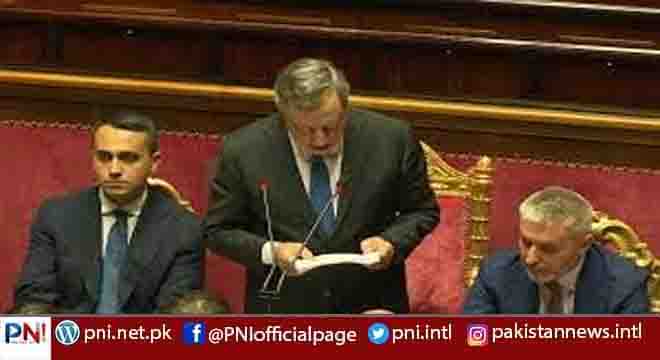Rome, July 20 (AFP/APP): Italy’s popular Prime Minister Mario Draghi looked out of time on Wednesday after three political parties refused to take part in a confidence vote, foiling efforts to resolve a crisis now expected to lead to his resignation and snap elections.
Draghi had made the support of parties across the political spectrum key to ending an impasse that risked destabilising the eurozone’s third largest economy just as it struggled with pressing domestic and geopolitical woes.
The decision by three parties — Silvio Berlusconi’s Forza Italia, the anti-immigrant League and populist Five Star Movement — to sit out the vote meant Draghi’s bid to revive his beleaguered coalition had failed.
Draghi technically won the vote, but was not expected to declare a victory after the parties’ snub.
The stand by “irresponsible” parties risked “creating a perfect storm,” EU Economy Commissioner Paolo Gentiloni said on Twitter, adding that Italy faced “difficult months ahead”.
“The centre-right will go down in history as the ones who got rid of Mario Draghi,” Francesco Galietti, Policy Sonar analyst, told AFP.
Draghi had warned the Senate that now was not the time for uncertainty, amid a myriad of challenges, from a struggling economy to the Ukraine war.
He called for “courage, selflessness, credibility” from parliamentarians, asking them: “Are you ready?”
– ‘Day of madness’ –
In a stern speech given Wednesday morning by a usually softly-spoken Draghi, the former leader of the European Central Bank, who offered his resignation last week, had said he was prepared to stay — but on one condition: if the wildly disparate parties pledged anew to a common agenda.
But the League and Forza Italia said it was impossible to recover trust lost after a crisis sparked by Five Star’s decision to opt out of a confidence vote last week.
Draghi had been persuaded by Italy’s president not to resign immediately, but to reach out to parties first. That attempt Wednesday failed.
“On this day of madness, parliament decided to turn against Italy,” Enrico Letta, head of the centre-left Democratic Party, said on Twitter.
“Italians will show in the ballot box that they are wiser than their representatives,” he said, as speculation mounted that Draghi would once again hand in his resignation.
Polls in the lead up to Wednesday’s drama suggested most Italians wanted Draghi, 74, to stay at the helm until the scheduled general election in May next year.
His departure could force the president to dissolve parliament and call elections for September or October.
“Draghi did not compromise. He was very tough,” Galietti said. “The entire speech was stick and carrot — though much more stick than carrot”.
There is much at stake: a government collapse could worsen social ills in a period of rampant inflation, delay the budget, threaten EU post-pandemic recovery funds and send jittery markets into a tailspin.
– ‘Not easy’ –
Draghi had said that as an unelected leader he needed the broadest consensus possible to tackle Italy’s most pressing issues: from a cost of living crisis and recession worries, to the rollout of key reforms and the Ukraine war.
His coalition had been able “to put aside divisions and come together… for rapid and effective action, for the good of all citizens”.
But that had dropped by the wayside as the parties began focusing more on their grassroot supporters ahead of next year’s ballot.
Draghi had “scolded his coalition partners for infighting and point-scoring” over the past few months and laid out a government line that “contains measures that either the League or the Five Star Movement firmly oppose”, Teneo consultancy’s Wolfango Piccoli said in a note.
“By not making any new concessions to either party, Draghi did not make it easy for the League and the Five Star.”
Anxious investors were watching closely. The spread — the difference between 10-year Italian and German treasury bonds — widened to 215 points by market close.
Wednesday’s vote comes a day before the European Central Bank unveils a tool to correct stress in bond markets for indebted eurozone members.
Follow the PNI Facebook page for the latest news and updates.









